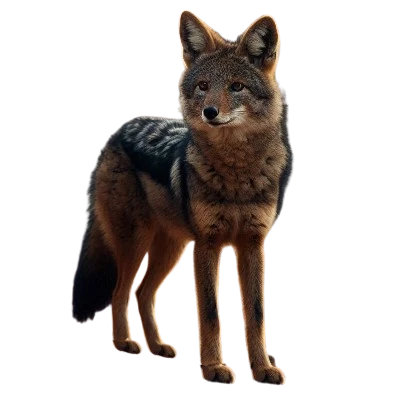
The Black-faced Jackal (Lycaon pictus) is a species of canid native to Africa, known for its remarkable adaptability to various habitats and its fascinating social behavior. This species of jackal, named for the characteristic dark markings on its cheeks, plays a key role in the balance of ecosystems in savannas and semi-arid regions.
The Black-faced Jackal is a small canid, measuring about 50 to 60 cm at the shoulder and weighing between 7 and 14 kg. Its coat is typically light gray to brown, with darker patches on the cheeks, which gives it its name. It has a slender and agile build, allowing it to move swiftly through its natural habitat. Its head is relatively small with large, pointed ears, and its eyes are yellow or amber.
The Black-faced Jackal (Lycaon pictus) belongs to the Canidae family, alongside dogs, wolves, and foxes. Here is the scientific classification of the Black-faced Jackal:
This jackal is more closely related to the African wild dog (Lycaon), another highly social canid known for its pack hunting strategies.
The Black-faced Jackal is mainly found in the savannas, grasslands, and semi-arid regions of East and Southern Africa. It prefers open habitats but can also live in more wooded areas near water sources. Although it is resilient and able to adapt to a variety of environments, it is still vulnerable to habitat loss due to human expansion.
The Black-faced Jackal is a territorial and social animal. It typically lives in small packs, although these can be larger in areas with abundant resources. Each pack is well-structured, with a dominant alpha pair. These jackals are also effective communicators, using vocalizations and body language to coordinate movements and hunting.
The Black-faced Jackal is an opportunistic carnivore. Its diet mainly consists of small mammals, birds, and reptiles, but it will also scavenge. Unlike other canids, it often hunts alone, although more experienced members of the pack cooperate to hunt larger prey.
Although the Black-faced Jackal is not currently critically endangered, it is vulnerable to growing threats related to human activities and habitat loss. Deforestation, illegal hunting, and competition with larger predators are affecting populations in certain areas. Conservation efforts are in place, but the situation of this species remains precarious in some regions.
The Black-faced Jackal belongs to the genus Lupulella, which also includes the Black-backed Jackal (Lupulella mesomelas). These two species share unique characteristics within the Canidae family, including their distinctive coat and hunting habits.
Observing the Black-faced Jackal in its natural habitat can be a rewarding experience. If you wish to have a chance to see this species, here are some useful tips:
By following these tips, you can contribute to the protection of the Black-faced Jackal while enjoying a unique observation experience.